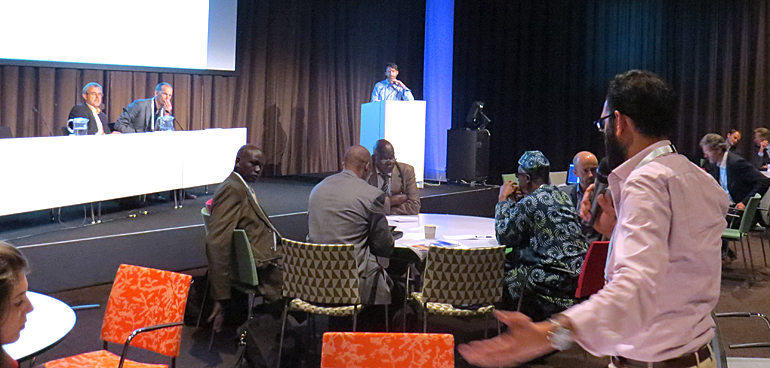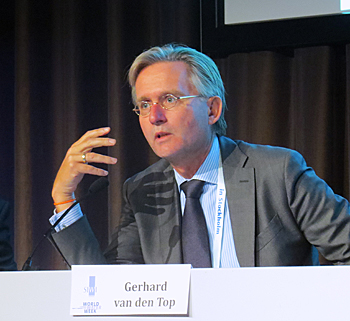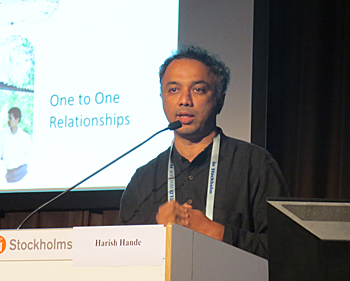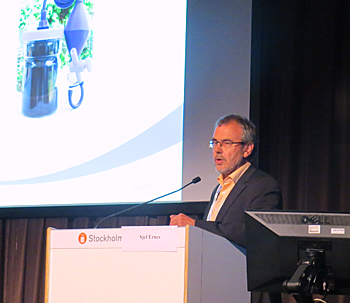Stockholm Water Week: Joint water-energy supplies in poor areas not as obvious as it seems
 "Water is life, water is public health", director Gerhard van den Top of Vitens-Evides International said during the wrap up of the seminar Designing our Water & Energy Future at the Stockholm Water Week on 4 September.
"Water is life, water is public health", director Gerhard van den Top of Vitens-Evides International said during the wrap up of the seminar Designing our Water & Energy Future at the Stockholm Water Week on 4 September.
Van den Top touched up on the most fundamental difference between energy supply and water supply. Water is for human consumption and therefore has to be of good quality. This requires specific health regulations.
 "Water supply shall therefore always remain in a more public domain than energy supply", concluded the director of VEI, a joint venture of the two biggest Dutch water supply companies.
"Water supply shall therefore always remain in a more public domain than energy supply", concluded the director of VEI, a joint venture of the two biggest Dutch water supply companies.
Vitens Evides International supports water companies in developing countries to become financially more healthy and in operating more efficient.
Nevertheless Van den Top was convinced there are opportunities for teaming up water, energy and health supplies, especially through shops and kiosks.
Success of decentralised energy supply
The seminar Designing our Water & Energy Future discussed the success of the energy sector that proved it is possible to create a utility market for poor people. Especially decentralized energy systems, such as solar installations, sell very well.
Can the water sector copy this success by teaming up with the energy sector? A lively debate proved that this is not as obvious as it seems.
The seminar was convened by the Australian International Water Centre in cooperation with Dutch partners Aqua for All, Netherlands Water Partnership, Rebel Group, Vitens-Evides International and Wetsus.
Focus on large infrastructures
Paul Gunstensen of Water & Sanitation for the Urban Poor (WSUP) set the scene and noted that development banks are the main investors in water and sanitation in developing countries.
Their main effort is on building large urban water distribution networks. This excludes less densely populated areas where such networks are not financially viable. Neither do such infrastructural investments address the issue of water quality and unreliable services.
According to Gunstensen utilities shall somehow have to find ways to improve their services for a lower water price. Low hanging fruit is the non-revenue water, starting with reducing the leakages in the distribution networks and addressing illegal taps.
Reuse of waste water and sludge is the holy grail, told Gunstensen. Especially if it produces energy that can be sold, not as biogas but as heat.
 Poor, very poor and abject poor
Poor, very poor and abject poor
Social entrepreneur Harish Hande, co-founder of Selco India, explained that not technology but finance is the biggest obstacle. It is very hard for poor people to get credit loans.
Yet, his company is very successful in selling solar energy and low smoke cook stoves to poor households. "We do not sell a low smoke cook stove on the issue of health", he assured. "Health is like a safety belt in a car. You wear it because the police watches you."
Hande differentiated the consumer market in three categories: poor, very poor and abject poor. His company aims at the top.
He warned that although this category has money to spend, they still will not pay for clean water.
"You must be able to show the value. If we deliver solar energy, we enable a poor household to buy a sewing machine and earn back their investment. Or they can buy a lamp, enabling their child to study in the evening", the Indian entrepeneur explained.
Hande told that his company is now exploring the viability of selling water related products.
 More appealing water products
More appealing water products
According to director Sjef Ernes of the non-profit organization Aqua for All, the energy sector out performs the water sector in many issues in developing countries.
He remarked that large rural areas in India are now covered by decentralised energy service deliveries.
"In the water sector we do not see the 4 billion poor people as consumers. That has to change", provoked Ernes. "Water products must fit into the needs of these people. It is not only a matter of low-tech and low-costs. It is more about good marketing and financing. We lack business models so investors are not interested in the water market for the poor."
Ernes challenged the water sector to develop water products that can be marketed with immediate satisfaction, such as a mobile phone, a lamp or a solar panel.
Training of future leaders
The seminar also touched on the subject of water leadership that incorporates new disciplines such as energy and finance.
"Students are educated in silos", professor Stefan Uhlenbrook of Unesco-IHE said. "Therefore our institute has introduced the concept of the T-shaped water professionals. The horizontal bar refers to the knowledge outside their own discipline. Not only do we teach our students about other water-related disciplines, but also about leadership and organizational management."
The International Water Centre initiated an International Water Leadership Program and the first training of new international water leaders will start in December.
The program is offered in cooperation with Dutch-based Unesco-IHE Institute for Water Education and Nyenrode Business University.
Also read on the website
• Stockholm Water Week: Photo coverage highlighting some remarkable Dutch contributions, 8 September 2014
• Stockholm Water Week: Rainwater management crucial for eradication global poverty, 4 September 2014
• Stockholm Water Week: Seven Dutch winners in cutting edge technology challenge on water and food, 3 September 2014
• Stockholm Water Week: Yes, access to clean drinking water for all, but how?, 2 September 2014
• Stockholm Water Week: Teaming up with energy service deliveries makes sense in world's poor places, 29 August 2014
• Stockholm Water Week: Unesco-IHE puts drip irrigation in perspective, 27 August 2014
• Dutch buzzword at Stockholm water week will be sustainable water services, 22 August 2014
• World water day 2014: Why does energy outperform water?, 21 March 2014
• 5th Delft symposium: global standards for water leadership to boost implementation creative solutions, 3 June 2013
More information
Aqua for All
The Hague, the Netherlands
+31 70 3519 725
www.aquaforall.nl
Vitens Evides International
Utrecht, the Netherlands
secretariaat.vei@vitens.nl
www.vitensevidesinternational.com
International Water Centre
Brisbane, Australia
+61 7 3014 0200
www.watercentre.org



